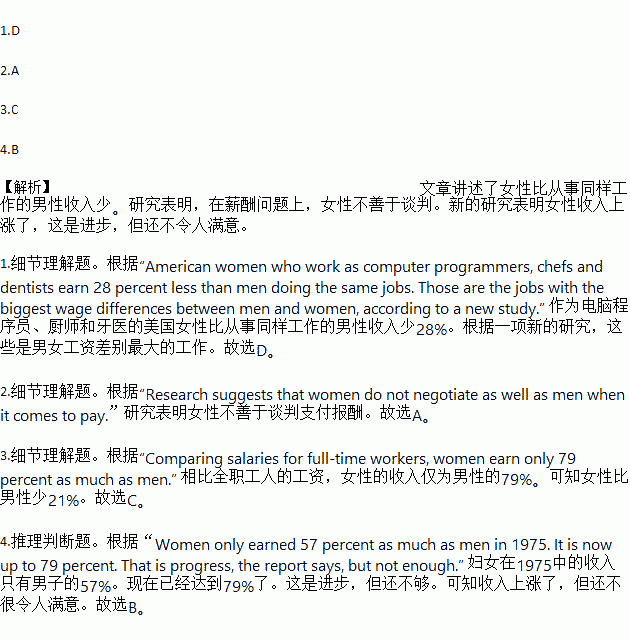题目内容
American women who work as computer programmers, chefs and dentists earn 28 percent less than men doing the same jobs. Those are the jobs with the biggest wage differences between men and women, according to a new study.
On the whole, the study found that women earn 5.4 percent less than men for doing the same job, in the same location and for the same employer. The wage differences between women and men were similar in the United Kingdom, Australia, Germany and France.
5.4 percent is a big difference in pay between men and women because it cannot be explained by women and men taking the same kinds of jobs. It can only be explained by bias(偏见) against women, or other causes, such as women not being good at asking for pay.
Research suggests that women do not negotiate as well as men when it comes to pay. And women are generally more uncomfortable asking fellow employees how much they make, so they cannot see if they are being paid fairly.
According to the study, women earned at least 15 percent less than men in these job categories: psychologists, pharmacists, physicians, opticians, pilots and game artists.
But in the fields of social work, selling merchandise, research assistants and physician advisors, women earn more than men. In social work, women earned 7.8 percent more than men, the report said. That was the job category with the biggest advantage for women. It was still far less than the 28 percent pay advantage for men in some fields.
Comparing salaries for full-time workers, women earn only 79 percent as much as men. Over a lifetime, that much of a difference in pay can amount to a large amount of money.
Women only earned 57 percent as much as men in 1975. It is now up to 79 percent. That is progress, the report says, but not enough.
1.Which of the following has the biggest pay differences between women and men?
A. A pilot. B. A game artist.
C. A research assistant. D. A computer programmer.
2.Why do women earn less than men when doing the same job?
A. They are not good at negotiating for pay.
B. They care less about their pay than men.
C. Women look down upon themselves.
D. They don’t work as effectively as men.
3.How much income do full-time women workers lose compared with men?
A. 5.4%. B. 7.8%.
C. 21%. D. 28%.
4.What does the report think of the women’s pay?
A. It is growing rather quickly. B. It is rising but not satisfying.
C. It is not fair for women workers. D. It is reasonable for present situation.



